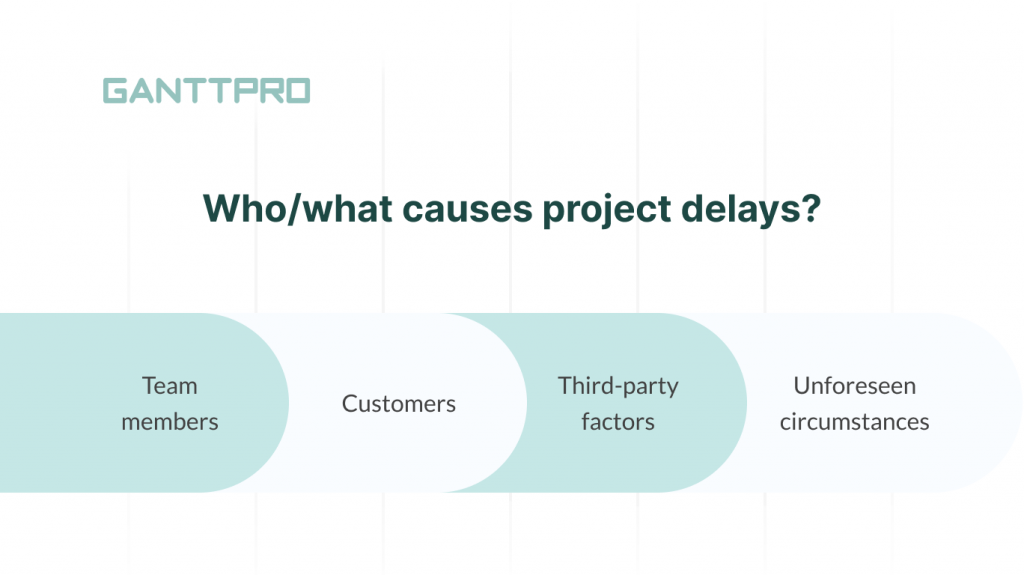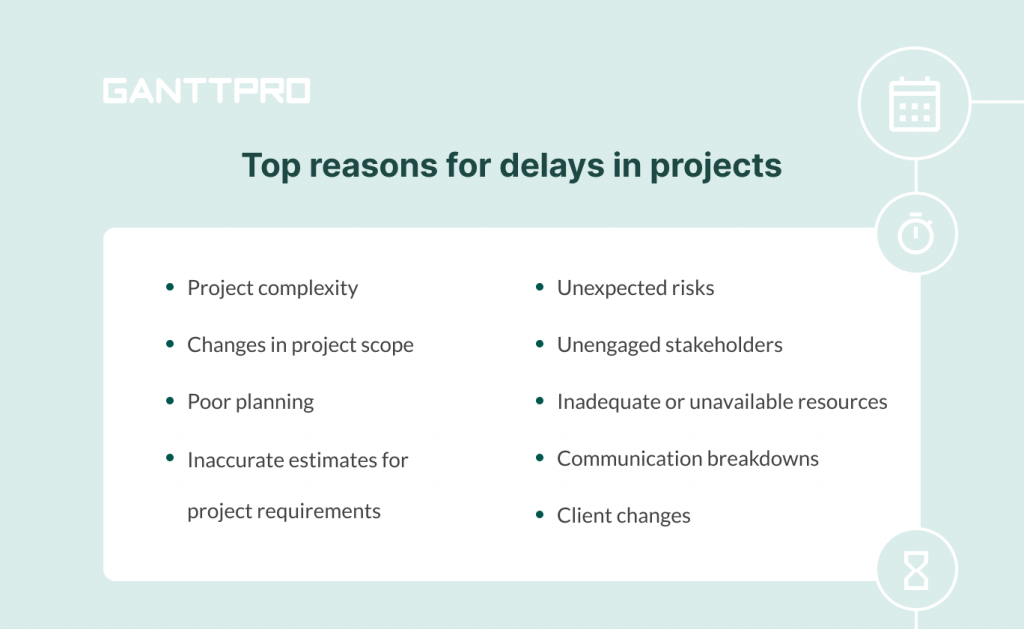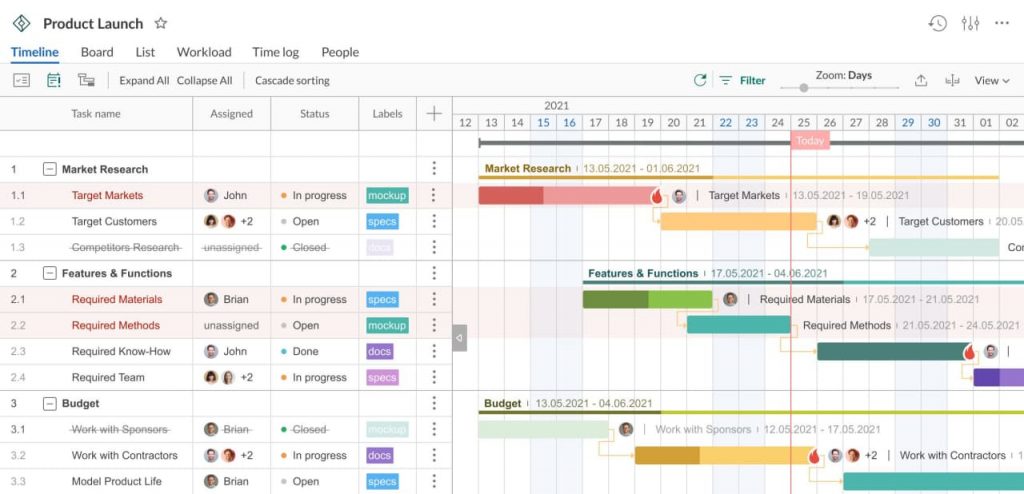How to Manage Project Delays: 10 Really Working Tips for Efficient Managers
October 7, 2021 / Estimated reading time: 10 minutes

If everything goes according to a plan, it means that you are living in an ideal world. However, we plan, God laughs.
Let’s notice: collapses and failures occur. Project delays do also happen.
Many projects finish late. Is it easy to catch the reason and understand how to avoid problems with schedules and deadlines in project management? Let’s find the answer in the following post.
Contents:
- What is a project delay?
- What causes delays.
- Common reasons for delays.
- Recommendations on how to deal with delays.
What is a project delay?
A project delay is typically an issue that can take companies over budget, cause them to miss deadlines, and sometimes derail projects.
Its impact on costs and timings can be significant, so project managers must pay special attention to its occurrence.
Projects in different spheres can have an extended period, complicated processes, financial intensity, etc. Such technological and organizational complexity creates serious risks, which can be resulted in the form of delays in project completion.
Delays can occur in construction, IT, financial, or other businesses. By communicating project delays, managers start to do their best for improvements and timely project completion.
What causes project delays?
Delays can happen for any scenario and reason. However, there are four common causes.

- Team members. Some of them can work on a task longer than required. Or they can have less experience and understanding.
- Customers. They may have a change of idea and require some alterations. They can be unsatisfied with the project’s progress and withhold funding for many reasons.
- Third-party factors. Most projects involve third-party individuals that usually don’t know all details about your plans, goals, or essential project milestones. They do not participate in discussions that happen in your team.
- Unforeseen circumstances. Weather disruptions or natural disasters can happen at any time. They can cause delays in your project. Do not also forget about the political or investment climate. Or consider the example from construction project management: according to the Associated General Contractors of America’s survey, 39% of contractors say projects have been halted/canceled in the wake of coronavirus.
For managers, it is critical to understand why projects can be delayed before starting to deal with the delays.
It’s time to list the most common reasons for the delay of work.
9 common reasons for project delays
Delays can be frustrating and costly. Projects get off track and behind schedule for a variety of reasons. Below is the list of the most common reasons for project schedule delays.

1. Project complexity
Complexity is one of the major factors for a time delay and cost overrun. Complex projects usually have a long implementation duration in comparison to the small ones. It may result in changes in price, exchange rates, and inflation rates.
Increased costs and long chains of negotiation eventually cause a delay in the overall project duration. Moreover, tasks with a high degree of complexity usually require complex plans, schedules, and estimations.
2. Changes in project scope
The scope defines the deliverables that are expected at the end of every project. Different changes in project scope or its poor definition can also produce severe delays.
These changes can happen due to project funding issues, miscalculations of inherent risks and uncertainties, changes in the clients’ interests, and so on. It can lead to changed deliverables, budget, or the entire team.
3. Poor planning
Poor planning and scheduling can also affect delays. It includes identifying the tasks or work activities to obtain the desired outcome in minimum time and costs. So any team must understand how to create a plan before executing activities to confirm the workflow, the value of money, and timely tasks completion.
4. Inaccurate estimates for project requirements
When it comes to requirements, inaccuracies can happen quite often.
The lack of documented requirements prevents the achievement of project goals. Remember that even a single improper requirement has the potential to affect all project processes.
5. Unexpected risks
There are no projects without risks. Managers know it and strive to identify all these potential risks in advance.
Unexpected risks can arise due to less involvement of the project manager. They can relate to running out of technical staff, new stakeholders demands, or the unavailability of reliable tools to handle problems. These kinds of risks can cause significant damage to the entire business.
6. Unengaged stakeholders
Another cause for the projects being behind schedule is less involvement and a communication gap between team members and stakeholders.
Often, essential documents are not communicated to stakeholders on time. It deprives them of the right to review the activities of the project. It commonly happens in the IT industry and results in delays.
7. Inadequate or unavailable resources
Inadequate or unavailable resources (both human and material) are also a significant cause of a project delay.
Your project can quickly get behind if team members get sick, quit, or switch to another project. When software breaks down, your budget can also promptly get cut. That is why managers should always know how to allocate resources in order to prevent significant delays.
8. Communication breakdowns
Both internal and external communication needs to flow with ease.
The completion of your project can also involve many departments and stakeholders. Communication breakdowns or even the lack of communication can cause setbacks in processing and hold up execution, resulting in delays in project completion.
9. Client changes
Late clients’ requests can throw the timing off track. When a client decides to alter the scope of a project by making any additions or deletions, the entire timeline will have to be reworked. That is why it is vital to require clients to sign off on a detailed contractual description of the project before its start.
So many reasons, right? But luckily, the causes for delays in your project can be preventable or reduced. Keep reading to get more.
10 tips on how to overcome project delays
Every project manager clearly understands that managing delays within the project lifecycle is crucial for successful outcomes.
No matter what the problem is, you should be ready to prevent delays before they happen and clean any scheduling messes. Let’s consider some reliable tips on how to manage your project delays efficiently.
1. Plan correctly
The first recommendation for avoiding possible delays is to pay special attention to project planning.
Thorough planning is the most significant defense against cost overruns and delays. By having a well-developed plan in place, you will decrease the overall uncertainty and risks.
You may plan and schedule well with just a pencil and paper. However, the best way to succeed is to apply a powerful online Gantt chart tool.
Although 56% of organizations have only used one project management system, there are many robust Gantt chart solutions to choose from.
A friendly Gantt diagram helps users to:
- Create and manage tasks.
- Track tasks’ progress.
- Visualize all the steps and project details.
- Diagnose potential challenges and solve problems before they turn into costly delays.
- Add task dependencies and milestones.
- Set deadlines.
Look how beautiful this chart is in GanttPRO:

Let’s quickly recall some persuasive GanttPRO features that will help you meet deadlines on time and keep track of your project progress, avoiding delays.
- Deadlines make the work with end dates easier. A unique flame sign won’t let you forget where assignments need to be finished.
- Overdue tasks help to recognize how many days are overdue. Such tasks have their end date in the past, however, they are still open or in progress (their progress is less than 100%). These tasks become red when you click on them.
- Baseline gives a clear picture of what was planned. It allows comparing the current state of your project with a planned one. So, you can track risks in advance and clearly understand what should be done to avoid schedule delays.
GanttPRO helps to make your plan exhaustive and full of the details required to complete any project.

Project management tool to deal with work delays
Get reliable ways to manage project delays effectively.
Sign up for free2. Keep all deadlines realistic
Set all deadlines according to the data from similar projects and your previous experience, not your imagination.
Realistic deadlines will less likely cause troubles than unrealistic plans that can damage your team’s efforts.
3. Collect accurate data
Before preparing your initial schedule, focus on pulling together the most comprehensive data possible on timing and task duration estimates.
Ask questions instead of just filling in the blanks in a template. By having current issues and challenges on your radar, you will proactively develop a better strategy to address the scheduling problems in advance.
4. Invite the right people to plan processes
Usually, project teams don’t have enough time for developing a project schedule. They often fill their schedules with guesses and provoke timeline troubles.
The right people and necessary experts will help you sidestep this pitfall and decrease the risk of project management delays.
5. Conduct frequent team meetings
Meetings are important. It is imperative for all team members involved to understand the role they play in project execution.
The first meeting sets goals, milestones, and timelines for the business to work with. And then, you can run team meetings regularly to clarify concerns and keep activities moving along smoothly.
6. Ensure reliable project control
It is always easier to head off a project delay than managing a schedule that’s already beginning to move. Firm project control will help you alert your team to any timing issues that may appear, giving them a chance to take action beforehand.
7. Measure progress
Ensuring that everything is on track keeps the project moving towards completion. Measuring performance will provide you with the information critical to meeting goals and staying in line with the entire plan.
8. Define task dependencies
Even if you understand that a delay cannot be avoided, you can mitigate its possible impact by knowing how your tasks and milestones are connected.
Outline task dependencies to give your team a starting point. Your colleagues will be able to resequence tasks and determine where it’s possible to change the schedule with the aim to prevent more delays.
9. Seek the opportunities for improvement
Try to evaluate what hinders your ability to deliver on time. Determine the sources of delays by analyzing your past performance data. Assess all the reasons that prevented you from keeping your work on track and take immediate action.
The more issues you reveal, the more chances you will get to improve your delivery workflow and avoid delays.
10. Find the positives associated with delays
Even a short delay can allow you to realign yourself and improve the quality of project deliverables. And you know what is the positive side here? It can prevent you from producing an inferior product.
Therefore, try to frame delays in a positive sense for your team, so they think they are working on a project that can come out to benefit your clients.
Conclusion
Unexpected delays can lead to serious problems. Hopefully, now you know how to protect against delays and possible risks.
Consider all the recommendations mentioned above, be proactive, anticipate risks, and communicate more often. Do not forget to keep your team informed throughout the entirety of the project. All tasks and deadlines must be available to everyone involved.
Finally, choose the appropriate management software with powerful features. It will help to make your next project as effective as possible, avoiding delays.
